
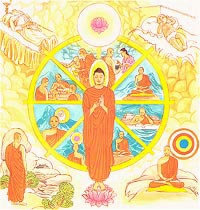
Verse 273. The Eight-fold Path Is Best
Of paths the Eight-fold is the best,
of truths the statement four,
the passionless of teachings best,
of humankind the Seer.
Explanation: Off all paths, the eight-fold path is the greatest. Of the truths, the greatest are the four noble truths. Detachment is the greatest of all states. And, of all those who are two-footed ones, one who possesses eyes. The Buddha is the greatest.
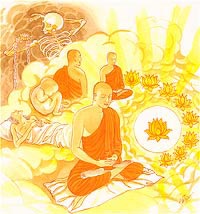
Verse 274. The Only Path To Purity
This is the path, no other’s there
for purity of insight,
enter then upon this path
bemusing Mara utterly.
Explanation: This is the path. There is no other for the achievement of clarity of insight. You must follow this path to the total bewilderment of mara.
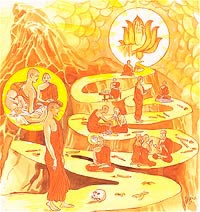
Verse 275. The Path To End Suffering
Entered then upon this path
you’ll make an end of dukkha.
Freed in knowledge from suffering’s stings
the Path’s proclaimed by me.
Explanation: If you follow this path, you will reach the termination of suffering. This path has been revealed by me, after the extraction of arrows.
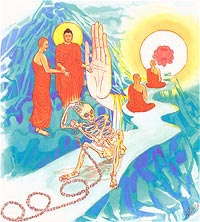
Verse 276. Buddhas Only Shows The Way
Buddhas just proclaim the Path
but you’re the ones to strive.
Contemplatives who tread the Path
are freed from Mara’s bonds.
Explanation: The effort must be made by yourself. The Buddhas (the Teachers) only show the way and direct you.Those contemplative meditators, who follow the path, fully and totally escape the snares of death.
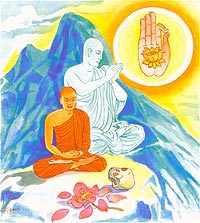
Verse 277. Conditioned Things Are Transient
When with wisdom one discerns
transience of conditioned things
one wearily from dukkha turns
treading the path to purity.
Explanation: All component things, all things that have been put together, all created things are transient, impermanent, non-constant. When this realized through insight, one achieves detachment form suffering. This is the path to total freedom from blemishes.
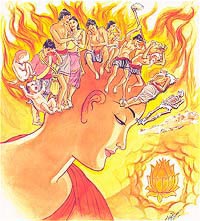
Verse 278. All Component Things Are Sorrow
When with wisdom one discerns
the dukkha of conditioned things
one wearily from dukkha turns
treading the path to purity.
Explanation: All component things – all things that have been put together – all created things are sorrow-fraught. When this is realized through insight, one achieves detachment from suffering. This is the path to total freedom from suffering.
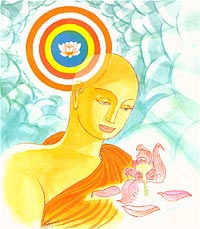
Verse 279. Everything Is Soul-less
When with wisdom one discerns
all knowables are not a self
one wearily from dukkha turns
treading the path to purity.
Explanation: All states of being are without a self. When this is realized through insight, one achieves detachment from suffering. This is the path of total freedom from suffering.
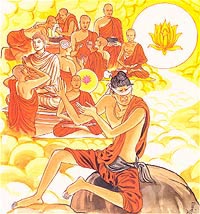
Verse 280. The Lazy Miss The Path
Though time to strive, not striving,
while young and strong yet indeed,
weak-minded and irresolute:
one finds not wisdom’s way.
Explanation: If an individual does not make an effort even at a time when exertion is due, if a person is lethargic even when he is young and strong; if a person suppresses the wholesome thoughts that arise in his mind, if he is lazy, he will not find the path to wisdom.
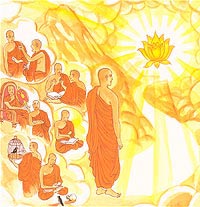
Verse 281. Purify Your Thoughts, Words And Deeds
In speech ever watchful with mind well-restrained
never with body do unwholesomeness.
So should one purify these three kamma-paths
winning to the Way made known by the Seers.
Explanation: If one is well-guarded in speech, well-restrained in mind, and if one refrains from physical misdeeds, that person will certainly attain the noble eight-fold path realized by the sages.
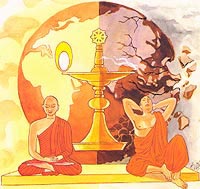
Verse 282. Way To Increase Wisdom
From endeavour wisdom springs,
lacking effort wisdom wanes:
having known this two-fold path
either to progress or decline
so should one exhort oneself
that wisdom may increase.
Explanation: From reflection and concentrated meditation refined wisdom arises. Through the non-practice of concentrated wisdom erodes. Once these two paths – one leading to progress and the other to decline – are recognized, one must conduct one’s self to increased wisdom.
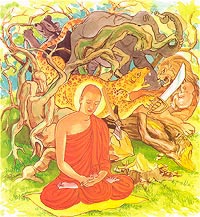
Verse 283. Shun Passion
The wood cut down but not a tree
since it’s from wood that fear is born.
Having cut wood and woodedness
O bhikkhus be without a wood.
Explanation: Monks, cut down the forest of defilements. But, do not cut down the trees. Fear comes from the forests of defilements. Clear both the forest and the undergrowth. Having done this achieve the state of Nibbana.
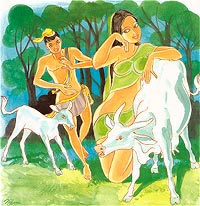
Verse 284. Attachment To Women
As long indeed as woodedness
of man to women is not cut
so long in bondage is one’s mind
as milch-calf to the mother cow.
Explanation: As long as a man’s mind is attached to women, even minutely, like a little undergrowth that has not been cut down, so long will his mind be attached like a suckling calf to its mother cow.
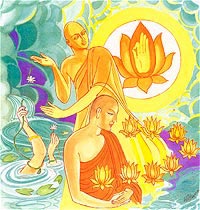
Verse 285. Path To Peace
Cut off affection for oneself
as a hand a lily in the Fall.
Cultivate this peaceful path,
Nibbana by the Buddha taught.
Explanation: Just like a person plucking out a lily with one’s own hand, pluck out your self-attachment. Cultivate the path to Nibbana, as advocated by the Buddha.
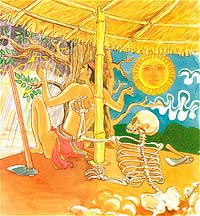
Verse 286. The Fear Of Death
Here shall I spend the Rains,
here the Winter, here the Summer.
Thus speculates the fool,
the danger he knows not.
Explanation: In the four months during retreat, winter or summer in a chosen place, the ignorant plans unaware of the threat of death.
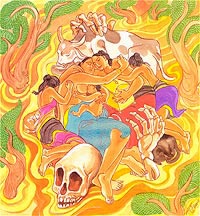
Verse 287. Death Takes Away The Attached
For one who has a clinging mind
and finds delight in babes and herds
Death does seize and carry away
as great flood a sleeping village.
Explanation: Men are proud that they process children, cattle and other forms of wealth. They tend to be proud that way because their minds are overcome with blemishes. Floods sweep away a sleeping village, taking along all its people and their possessions. In the same way, death comes unaware and sweeps along the people however proud they are of their possessions.
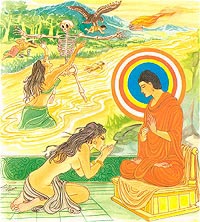
Verse 288. No Protection When Needed
No sons are there for shelter
nor father nor related folk,
one by the Death-king seized upon
in kin no shelter finds.
Explanation: When and individual is gripped by death, sons cannot protect one. Not even one’s father can shield a person from the grip of death. Nor can one’s relations come to the rescue.
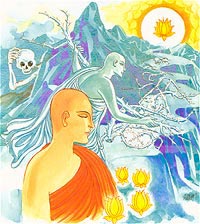
Verse 289. The Path To The Deathless
Having understood this fact
the wise by virtue well-restrained
swiftly then should clear the path
leading to Nibbana.
Explanation: Being aware that no one can rescue you from death, the wise person, who is restrained and disciplined, should clear the path to Nibbana, without any loss of time.

